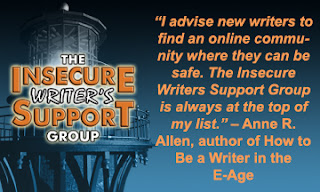Encouraging an emotional bond between a reader and the protagonist is one of the most important jobs a writer has. We do this through empathy - a deep, meaningful connection that forms when we put the reader into the character’s emotional shoes. Many writers struggle with how to do this because it usually means showing the character’s vulnerability.
This can be a tall order if one has a tough character who equates emotions with weakness, because their hard shell prevents anyone from getting close (thanks a lot, emotional wounds). The problem is, readers need to get close, so we need to find a way to make that happen.
As people, we connect to vulnerability. It makes us feel that we are seeing into the heart of who someone truly is. So, making sure our characters experience vulnerability, no matter how tough, how jaded, how determined they are to hide what they feel, is incredibly important.
The problem is that most people don’t like feeling vulnerable, and so true-to-life characters won’t either. This leaves writers with a conundrum: how do they show their character in a vulnerable light to help create that closeness with the reader, yet stay true to authentic human behavior?
The answer lies in understanding universal triggers for vulnerability, and then placing the protagonist in the path of one.
Psychological Situations that Cause Vulnerability
Not knowing what will happen next.
People crave control, of having power over what the future will bring. Take this away and there’s only the feeling of not knowing, of having no influence or say in the outcome. By placing the power someone else’s hands-their choices, actions, and decisions--you rob your character of control. The resulting feelings of frustration, anxiety and even despair are all ones that reinforce vulnerability. Readers have all experienced a loss of control and so will deeply identify with the character’s range of feelings.
Mistakes they make.
Despite best efforts, we all make mistakes. Not only do we hate it when one happens, we tend to beat ourselves up about it, growing frustrated and disappointed for not being smarter, stronger, or better. Characters who make mistakes and who think and feel as people do will come across as authentic and human. And the bonus? Mistakes lead to plot complications & conflict!
Personal failures.
Being unable to do what one has set out to do is one of the
most heartbreaking moments an individual can experience, and it will be the
same for a character. A hero’s personal failure, especially one that carries
repercussions for others, is one way to break down those steel walls and reveal
their vulnerability.
A death or loss.
A deep, personal loss is never easy. Often a person only realizes what they had or what something meant when it’s gone. Again, this is a universal feeling, something all readers can identify with. Written well, seeing a character experience loss will remind readers of their own experiences. Death is final, but other losses can be potent as well. The loss of hope is particularly wounding.
Challenging their role.
Whatever the character’s role is (a leader, a provider, a source of comfort, etc.), having it challenged can be devastating. Roles are tied to identity: the husband who loses his job may no longer be able to provide for his family. The leader who made a bad decision must witness the resulting lack of faith from his followers. The mother who fails to keep her child safe feels unsuited for motherhood. When a role is challenged through choice, circumstances, or competitors, it creates self-doubt, making the character feel vulnerable in a way readers identify with.
Casting doubt on what they believe.
Each person has set beliefs about the universe, how the world works, and the people in it, allowing them to understand their place in the big picture and instilling feelings of belonging. When knowledge surfaces that puts trusted beliefs into question, the character suffers disillusionment, a powerful feeling that can make them feel adrift in their own life.
Disillusionment is an emotional blow that everyone has felt, so it can be a good way to trigger that feeling of shared experience between the character and reader.
Through worry for another.
This ties into that loss of control mentioned above, because try as they might, a person will encounter situations where they can’t influence circumstances affecting a loved one. Fear and worry lead to roadblocks on how to proceed, and the feeling of powerless about it all causes a great deal of vulnerability. Put your characters in this situation where they can’t fix a problem for someone they care for and show how it feels to be unable to steer the outcome.
Revealing their secret.
Secrets are hidden for a reason and are often the source of guilt or shame. When the character’s secret is revealed, they are stripped of their security, and will they believe others will view them differently as a result. Readers can empathize with this raw feeling of being exposed.
Have ideas on other ways to make our character feel vulnerable?
Let me know in the comments!
Angela Ackerman is a story coach, international speaker, and co-author of the bestselling book, The Emotion Thesaurus: A Writer’s Guide to Character Expression, and its many sequels. Available in nine languages, her guides are sourced by US universities, recommended by agents and editors, and are used by novelists, screenwriters, and psychologists around the world. To date, this book collection has sold over a million copies. Angela is also the co-founder of the popular site Writers Helping Writers®, as well as One Stop for Writers®, a portal to game-changing tools and resources that enable writers to craft powerful fiction. Find her on Facebook, Twitter, and Instagram.
If you’d like to download the tip sheet on secrets above, you can do so HERE.







